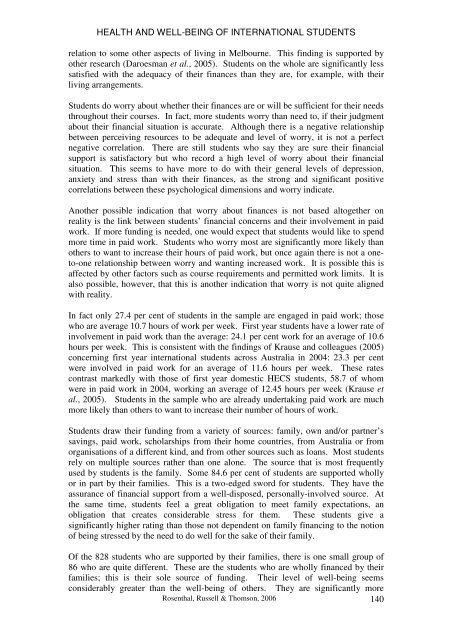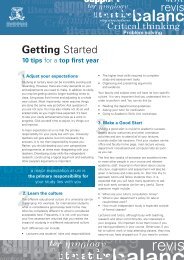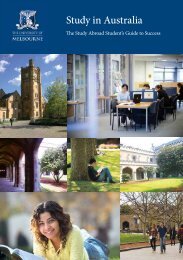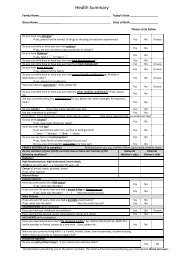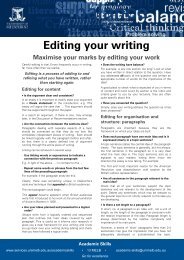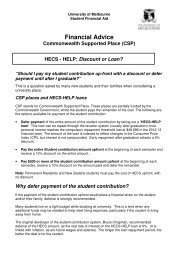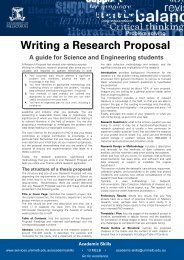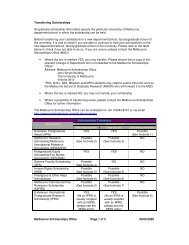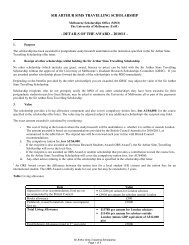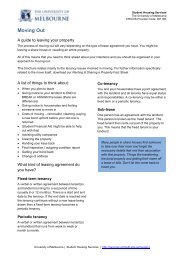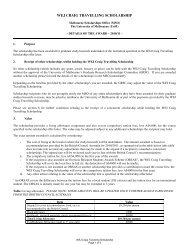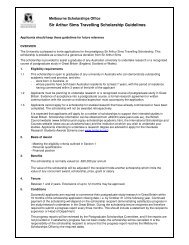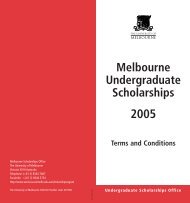a growing experience - Student Services - University of Melbourne
a growing experience - Student Services - University of Melbourne
a growing experience - Student Services - University of Melbourne
You also want an ePaper? Increase the reach of your titles
YUMPU automatically turns print PDFs into web optimized ePapers that Google loves.
HEALTH AND WELL-BEING OF INTERNATIONAL STUDENTSrelation to some other aspects <strong>of</strong> living in <strong>Melbourne</strong>. This finding is supported byother research (Daroesman et al., 2005). <strong>Student</strong>s on the whole are significantly lesssatisfied with the adequacy <strong>of</strong> their finances than they are, for example, with theirliving arrangements.<strong>Student</strong>s do worry about whether their finances are or will be sufficient for their needsthroughout their courses. In fact, more students worry than need to, if their judgmentabout their financial situation is accurate. Although there is a negative relationshipbetween perceiving resources to be adequate and level <strong>of</strong> worry, it is not a perfectnegative correlation. There are still students who say they are sure their financialsupport is satisfactory but who record a high level <strong>of</strong> worry about their financialsituation. This seems to have more to do with their general levels <strong>of</strong> depression,anxiety and stress than with their finances, as the strong and significant positivecorrelations between these psychological dimensions and worry indicate.Another possible indication that worry about finances is not based altogether onreality is the link between students’ financial concerns and their involvement in paidwork. If more funding is needed, one would expect that students would like to spendmore time in paid work. <strong>Student</strong>s who worry most are significantly more likely thanothers to want to increase their hours <strong>of</strong> paid work, but once again there is not a oneto-onerelationship between worry and wanting increased work. It is possible this isaffected by other factors such as course requirements and permitted work limits. It isalso possible, however, that this is another indication that worry is not quite alignedwith reality.In fact only 27.4 per cent <strong>of</strong> students in the sample are engaged in paid work; thosewho are average 10.7 hours <strong>of</strong> work per week. First year students have a lower rate <strong>of</strong>involvement in paid work than the average: 24.1 per cent work for an average <strong>of</strong> 10.6hours per week. This is consistent with the findings <strong>of</strong> Krause and colleagues (2005)concerning first year international students across Australia in 2004: 23.3 per centwere involved in paid work for an average <strong>of</strong> 11.6 hours per week. These ratescontrast markedly with those <strong>of</strong> first year domestic HECS students, 58.7 <strong>of</strong> whomwere in paid work in 2004, working an average <strong>of</strong> 12.45 hours per week (Krause etal., 2005). <strong>Student</strong>s in the sample who are already undertaking paid work are muchmore likely than others to want to increase their number <strong>of</strong> hours <strong>of</strong> work.<strong>Student</strong>s draw their funding from a variety <strong>of</strong> sources: family, own and/or partner’ssavings, paid work, scholarships from their home countries, from Australia or fromorganisations <strong>of</strong> a different kind, and from other sources such as loans. Most studentsrely on multiple sources rather than one alone. The source that is most frequentlyused by students is the family. Some 84.6 per cent <strong>of</strong> students are supported whollyor in part by their families. This is a two-edged sword for students. They have theassurance <strong>of</strong> financial support from a well-disposed, personally-involved source. Atthe same time, students feel a great obligation to meet family expectations, anobligation that creates considerable stress for them. These students give asignificantly higher rating than those not dependent on family financing to the notion<strong>of</strong> being stressed by the need to do well for the sake <strong>of</strong> their family.Of the 828 students who are supported by their families, there is one small group <strong>of</strong>86 who are quite different. These are the students who are wholly financed by theirfamilies; this is their sole source <strong>of</strong> funding. Their level <strong>of</strong> well-being seemsconsiderably greater than the well-being <strong>of</strong> others. They are significantly moreRosenthal, Russell & Thomson, 2006 140


